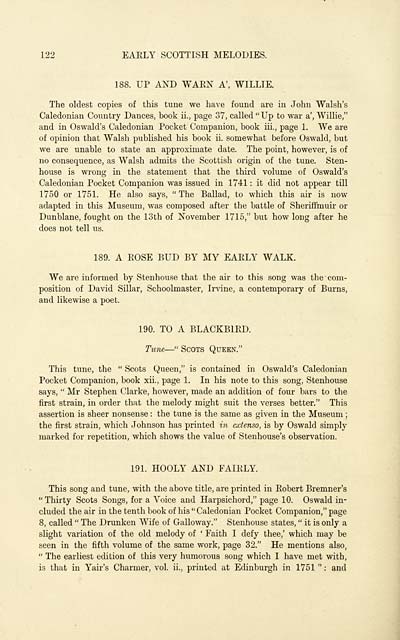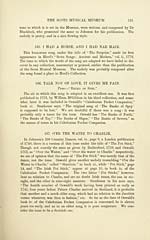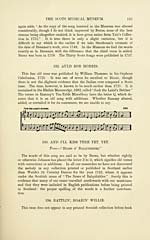Inglis Collection of printed music > Printed text > Early Scottish melodies
(144) Page 122 - Up and warn a', Willie
Download files
Complete book:
Individual page:
Thumbnail gallery: Grid view | List view

122 EAELY SCOTTISH MELODIES.
188. UP AND WAEN A', WILLIE.
The oldest copies of this tune we have found are in John Walsh's
Caledonian Country Dances, book ii., page 37, called "Up to war a', Willie,"
and in Oswald's Caledonian Pocket Companion, book iii., page 1. We are
of opinion that Walsh published his book ii. somewhat before Oswald, but
we are unable to state an approximate date. The point, however, is of
no consequence, as Walsh admits the Scottish origin of the tune. Sten-
house is wrong in the statement that the third volume of Oswald's
Caledonian Pocket Companion was issued in 1741 : it did not appear till
1750 or 1751. He also says, "The Ballad, to which this air is now
adapted in this Museum, was composed after the battle of Sheriffmuir or
Dunblane, fought on the 13th of November 1715," but how long after he
does not tell us.
189. A KOSE BUD BY MY EAELY WALK.
We are informed by Stenhouse that the air to this song was the ■ com-
position of David Sillar, Schoolmaster, Irvine, a contemporary of Burns,
and likewise a poet.
190. TO A BLACKB1ED.
Tune — " Scots Queen."
This tune, the " Scots Queen," is contained in Oswald's Caledonian
Pocket Companion, book xii., page 1. In his note to this song, Stenhouse
says, " Mr Stephen Clarke, however, made an addition of four bars to the
first strain, in order that the melody might suit the verses better." This
assertion is sheer nonsense : the tune is the same as given in the Museum ;
the first strain, which Johnson has printed in cxtenso, is by Oswald simply
marked for repetition, which shows the value of Stenhouse's observation.
191. HOOLY AND FAIELY.
This song and tune, with the above title, are printed in Eobert Bremner's
" Thirty Scots Songs, for a Voice and Harpsichord," page 10. Oswald in-
cluded the air in the tenth book of his "Caledonian Pocket Companion," page
8, called " The Drunken Wife of Galloway." Stenhouse states, " it is only a
slight variation of the old melody of ' Faith I defy thee,' which may be
seen in the fifth volume of the same work, page 32." He mentions also,
" The earliest edition of this very humorous song which I have met with,
is that in Yair's Charmer, vol. ii., printed at Edinburgh in 1751 " : and
188. UP AND WAEN A', WILLIE.
The oldest copies of this tune we have found are in John Walsh's
Caledonian Country Dances, book ii., page 37, called "Up to war a', Willie,"
and in Oswald's Caledonian Pocket Companion, book iii., page 1. We are
of opinion that Walsh published his book ii. somewhat before Oswald, but
we are unable to state an approximate date. The point, however, is of
no consequence, as Walsh admits the Scottish origin of the tune. Sten-
house is wrong in the statement that the third volume of Oswald's
Caledonian Pocket Companion was issued in 1741 : it did not appear till
1750 or 1751. He also says, "The Ballad, to which this air is now
adapted in this Museum, was composed after the battle of Sheriffmuir or
Dunblane, fought on the 13th of November 1715," but how long after he
does not tell us.
189. A KOSE BUD BY MY EAELY WALK.
We are informed by Stenhouse that the air to this song was the ■ com-
position of David Sillar, Schoolmaster, Irvine, a contemporary of Burns,
and likewise a poet.
190. TO A BLACKB1ED.
Tune — " Scots Queen."
This tune, the " Scots Queen," is contained in Oswald's Caledonian
Pocket Companion, book xii., page 1. In his note to this song, Stenhouse
says, " Mr Stephen Clarke, however, made an addition of four bars to the
first strain, in order that the melody might suit the verses better." This
assertion is sheer nonsense : the tune is the same as given in the Museum ;
the first strain, which Johnson has printed in cxtenso, is by Oswald simply
marked for repetition, which shows the value of Stenhouse's observation.
191. HOOLY AND FAIELY.
This song and tune, with the above title, are printed in Eobert Bremner's
" Thirty Scots Songs, for a Voice and Harpsichord," page 10. Oswald in-
cluded the air in the tenth book of his "Caledonian Pocket Companion," page
8, called " The Drunken Wife of Galloway." Stenhouse states, " it is only a
slight variation of the old melody of ' Faith I defy thee,' which may be
seen in the fifth volume of the same work, page 32." He mentions also,
" The earliest edition of this very humorous song which I have met with,
is that in Yair's Charmer, vol. ii., printed at Edinburgh in 1751 " : and
Set display mode to: Large image | Transcription
Images and transcriptions on this page, including medium image downloads, may be used under the Creative Commons Attribution 4.0 International Licence unless otherwise stated. ![]()
| Special collections of printed music > Inglis Collection of printed music > Printed text > Early Scottish melodies > (144) Page 122 - Up and warn a', Willie |
|---|
| Permanent URL | https://digital.nls.uk/94645000 |
|---|---|
| Description | Also: A rose bud by my early walk. Also: To a blackbird. Also: Hooly and fairly. |
| Description | Scottish and English songs, military music and keyboard music of the 18th and 19th centuries. These items are from the collection of Alexander Wood Inglis of Glencorse (1854 to 1929). Also includes a few manuscripts, some treatises and other books on the subject. |
|---|
| Description | The Glen Collection and the Inglis Collection represent mainly 18th and 19th century Scottish music, including Scottish songs. The collections of Berlioz and Verdi collected by bibliographer Cecil Hopkinson contain contemporary and later editions of the works of the two composers Berlioz and Verdi. |
|---|

